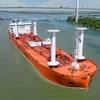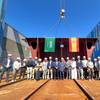Legal Notes
Repair Duty Repealed
President George Bush has signed into law legislation repealing a four year old rule imposing a 50% duty on the cost of routine repairs and maintenance carried out by U.S. merchant mariners while their vessel is at sea. The elimination of the duty, which customs authorities have levied on US-flag carriers since April 2001, represents a victory for the domestic shipowning community. The community has lobbied hard against it since its introduction.
Intelligence Reform and Terrorism Prevention Act of 2004
President Bush signed into law the Intelligence Reform and Terrorism Prevention Act of 2004 (S. 2845). The major emphasis of the legislation is reform of the U.S. intelligence organization. Other measures, though, may impact the maritime community. The Secretary of Homeland Security is directed to prepare a National Strategy for Transportation Security. This document is identify and evaluate transportation assets (including maritime) in the United States that must be protected from attack or disruption and develop a risk-based priority addressing those security needs. Also, the Secretary is to promulgate a rule requiring operators of cruise ships to provide passenger and crew information so that the Department can develop a “watch list” program similar to that utilized by airlines. The problem is that the definition of “cruise ship” is so broad as to include any vessel on an international voyage that embarks or disembarks passengers in the United States. This provision has the potential to capture recreational vessels and small charter boats. One wonders whether, in the last minute rush to cobble this bill together, the members of Congress actually knew what this provision entailed. (12/17/04).
Consolidated Appropriations Act, 2005
President Bush signed into law the Consolidated Appropriations Act, 2005 (H.R. 4818). This 658-page bill provides monies for all federal agencies other than Defense and Homeland Security, which were handled earlier. The bill also includes a number of miscellaneous provisions. Some maritime highlights follow. Ocean freight differential costs for shipment of certain government-impelled agricultural shipments are funded in the amount of $22.7 million. The National Oceanic and Atmospheric Administration (NOAA) receives $2.8 billion for operations and $1 billion for procurement, acquisition, and construction. The bill includes the Oceans and Human Health Act, intended largely to implement portions of the recommendations for the Ocean Policy Commission. The U.S. Army Corps of Engineers receives $1.8 billion for construction, including river and harbor projects. Foreign military assistance monies for the Indonesian navy are for purposes of enhancing maritime security. The St. Lawrence Seaway Development Corporation receives $15.9 million, to be derived from the Harbor Maintenance Trust Fund. The Maritime Administration (MARAD) receives $98.7 million for the maritime security fleet program; $109.5 million for operations and training; $21.6 million for disposal of obsolete vessels; $4.76 million for the Title XI program; and $75 million for the national defense tank vessel construction program. The Federal Maritime Commission (FMC) receives $19.5 million. The National Transportation Safety Board (NTSB) receives $76.7 million. The allocation of funding for the Maritime and Land Security Division of the Transportation Security Administration (TSA) will be as follows: credentialing, $5 million; TWIC, $15 million; hazardous materials truck tracking, $2 million; hazardous materials safety, $17 million; enterprise staffing, $24 million; rail security, $12 million; and offsetting collections, $27 million. (HK Law).
Negligent Homicide with Yacht Leads to Loss of Coverage
The U.S. Court of Appeals for the First Circuit ruled that, where the owner of a yacht was convicted of negligent homicide in connection with a fatal collision, the insurance company is not obligated to defend under a policy excluding losses “criminally caused or incurred” by the insured. In the instant case, plaintiff was operating his yacht when it collided with another boat, killing one of the passengers of the boat. He was convicted of negligent homicide for failing to keep a proper lookout. Plaintiff was also sued for wrongful death by the widow and executrix of the deceased. Plaintiff sought declaratory judgment that his yacht insurance company was obligated to defend the wrongful death action. The court ruled that conviction for criminally negligent homicide encompassed the requisite mental state to abrogate coverage under the marine insurance policy. Littlefield v. Acadia Insurance Company, No. 04-1751 (1st Cir., December 8, 2004).
Fire Suppression Systems at Waterfront Facilities
The U.S. Court of Appeals for the First Circuit ruled that the owner of a waterfront facility used for offloading petroleum could not recover costs of improvements to its fire suppression system because it did not prove that the improvements were required by regulation. Under its contract with nearby oil terminals to which it was connected by pipelines, costs for compliance with city, state, or federal regulations applicable to operation of the pipelines was to be borne by the oil terminals. Meetings held at the Coast Guard’s Marine Safety Office with the waterfront facility and federal, state, and local officials raised concerns about the insufficiency of the fire suppression system at the facility. The local fire department, relying in large part on a provision of the National Fire Protection Association (NFPA) Code, convinced the facility to upgrade its fire suppression system. The facility then brought suit against the oil terminals to recoup the cost of the upgrade. At an unnecessarily complicated trial, the facility relied primarily on the NFPA Code to sustain its position. The court held that the facility failed to prove that its costs were required by a federal, state, or local regulation and denied recovery. It is unclear why the facility did not pursue at trial applicable Coast Guard requirements for fire safety at waterfront facilities. A concurring opinion contains a lengthy discussion of safety codes and related issues. Getty Petroleum Marketing, Inc. v. Capital Terminal Company, No. 03-2324 (1st Cir., December 10, 2004). – HK Law
EC confirms funding for GALILEO
The European Commission (EC) said funding for the GALILEO project of radio navigation satellites has been confirmed. Deployment of the satellites, which will complement the GPS system, is scheduled to begin in 2006, with full operation to begin in 2008.
Canada Invest to Nab Marine Polluters
Transport Minister Jean-C. Lapierre announced that Canada has invested $2.3 million on new marine pollution aerial surveillance equipment and training to strengthen Transport Canada's National Aerial Surveillance Program. "The Government of Canada is committed to preventing pollution from ships and to continuously enhancing the protection of our marine environment," said Mr. Lapierre. "This technology will significantly strengthen our surveillance program and help us achieve this goal."
Currently, this surveillance relies on visual detection from crew on board an aircraft, who can survey approximately two nautical miles on each side of the aircraft. The new equipment will be able to detect surface anomalies, such as oil, up to approximately 25 nautical miles on each side of the aircraft. Therefore, this equipment will significantly increase Transport Canada's ability to detect illegal discharges from passing vessels even in conditions of reduced visibility, such as darkness or low cloud cover. The system will also assist the Department of Fisheries and Oceans/Canadian Coast Guard and Environment Canada with containment and cleanup operations by detecting, tracking and helping determine the characteristics of oil slicks.
The new equipment includes: a side-looking airborne radar; an ultraviolet/infrared line scanner; an Airborne Automated Identification System transponder for receiving ship identity information; a high-resolution digital photography camera and video system with GPS data annotation; and a data processor interface that integrates all systems into one user console to ensure maximum efficiency during routine and emergency situations. Transport Canada has acquired this equipment from the Swedish Space Corporation of Solna, Sweden.















